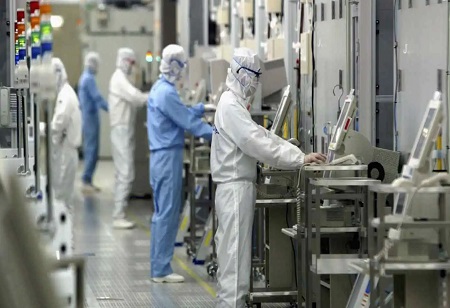
Japan to spend $2.4bn on joint chip research hub with U.S.

 Japan plans to budget 350 billion yen ($2.38 billion) in a research collaboration with the U.S. on the development of next-generation semiconductors.
Japan plans to budget 350 billion yen ($2.38 billion) in a research collaboration with the U.S. on the development of next-generation semiconductors.
The spending is included in a secondary supplementary budget bill for the current fiscal year that will also include 450 billion yen toward bringing production hubs for advanced chips to Japan as well as 370 billion yen for securing materials essential for manufacturing.
The joint research hub will be established by the end of the year with the goal of developing and putting in place the ability to mass produce advanced semiconductors with circuit line widths of 2 nanometers by the latter half of the decade. The finer the circuit, the higher the chip performance.
Names of participating Japanese companies and other details will be announced this month. The University of Tokyo, the National Institute of Advanced Industrial Science and Technology and science institute Riken will participate as will companies and research institutions in the U.S. and Europe.
IBM, the U.S. company that former Minister of Economy, Trade and Industry Koichi Hagiuda visited in May, is among the candidates for participation.
The 450 billion yen will be spent on securing production hubs for advanced semiconductors in Japan. The amount of spent on this effort, including the 617 billion yen in a supplementary budget last year, will exceed 1 trillion yen.
The government has already approved subsidies for Taiwan Semiconductor Manufacturing, Kioxia, and America's Micron Technology to build plants in Japan that manufacture semiconductors needed for data centers, artificial intelligence and other cutting-edge technologies.
The 370 billion yen will be used to encourage the strengthening of supply networks for such materials as silicon wafers and silicon carbide.
The Ministry of Economy, Trade and Industry is expanding support for semiconductors not only because of their importance to economic security, but also because it sees the historic depreciation of the yen as an opportunity to attract investment.
The aim is to create an economic cycle where increases in employment and wages in regions are triggered by large-scale investment.
The second supplementary budget bill also includes 1 trillion yen for the diversification of supply chains for batteries, permanent magnets and rare earths. All are expected to be designated as critical goods under the Economic Security Promotion Act.
Prime Minister Fumio Kishida has announced that 3 trillion yen will be invested in next-generation fields, including semiconductors. It is expected a little under 1 trillion yen will be invested in batteries and robots.

